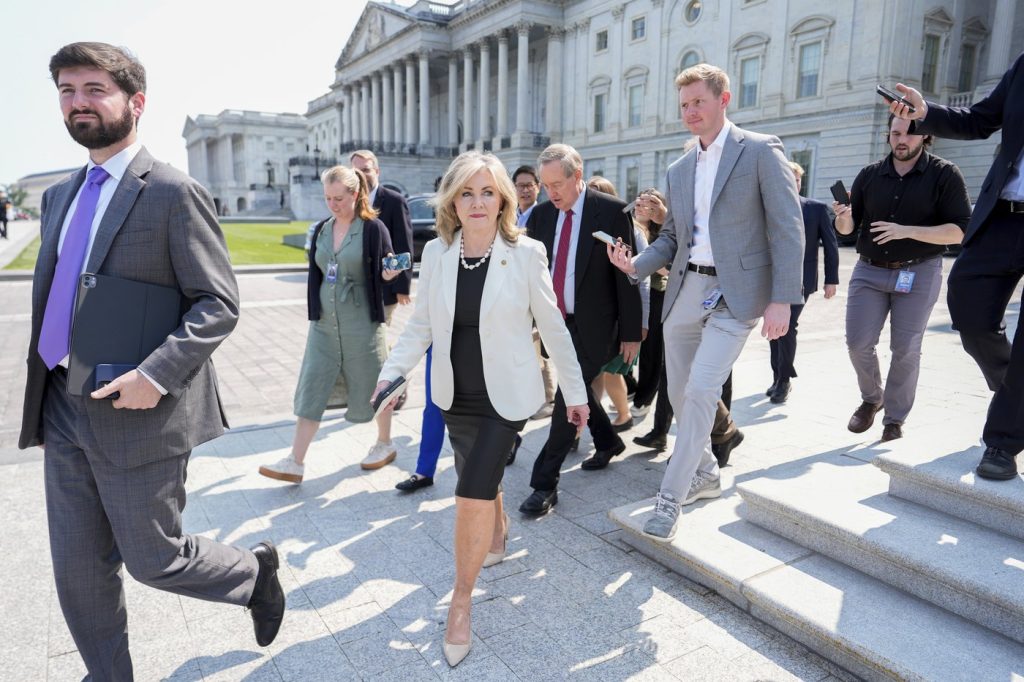NEW YORK (AP) – A contentious proposal aimed at preventing states from regulating artificial intelligence (AI) for a decade appeared poised for passage as part of a Republican tax cut and spending bill backed by President Donald Trump in the U.S. Senate. However, as the bill moved toward a final vote, growing opposition from various conservative factions—including Republican governors, lawmakers, think tanks, and advocacy groups—dwindled support for the measure.
Notably, conservative activist Mike Davis urged viewers on right-wing podcaster Steve Bannon's show to contact their senators to reject what he termed "AI amnesty" for "trillion-dollar Big Tech monopolists." He indicated that he had communicated directly with Trump, suggesting that the president remain neutral on this issue amidst pressure from the White House's AI czar David Sacks, Commerce Secretary Howard Lutnick, and Texas Senator Ted Cruz.
The divide amongst conservatives was evident as some party members supported the legislative moratorium, believing it crucial to compete against China in the growing AI sector. This schism highlighted a significant division within the GOP regarding state autonomy over technology regulation versus minimizing federal interference.
Ultimately, those advocating for regulatory guardrails prevailed, exposing the considerable influence of Republicans wary of Big Tech. This faction argues for states' rights to protect citizens from potential risks associated with emerging technologies, including AI and social media. Adam Thierer from the R Street Institute, who originally proposed the AI moratorium, noted that an increasing distrust of Big Tech among conservatives was a key factor in this debate.
In a decisive turn of events, on Monday night, Republican Senator Marsha Blackburn of Tennessee—who opposed the AI provision—collaborated with Democratic Senator Maria Cantwell of Washington to propose removing the entire regulation from the bill. By the following morning, the AI measure was abolished by a unanimous vote of 99-1 in the Senate.
The rapid undoing of a provision that had garnered support from House and Senate leadership and the White House also disappointed conservatives who believed it would grant China a competitive edge in AI advancements. Ryan Fournier, chair of Students for Trump and chief marketing officer of Uncensored AI, previously backed the moratorium, arguing it would prevent states like California and New York from compromising America's future in relation to China. He expressed frustration with the party's divide on the issue, advocating for consistent rules across states.
Proponents of the regulation argued that tech companies, trade groups, venture capitalists, and several figures from the Trump administration supported the moratorium in order to avoid a confusing array of state rules. Lutnick stated the measure would enable American firms to develop critical technology without obstruction from "anti-innovation politicians," while AI czar Sacks publicly endorsed it as well.
After the Senate's rejection of the provision, the White House reaffirmed Trump's support for the Senate-approved version of the spending and tax bill. In accepting the defeat of the provision, Cruz expressed concern about how pleased liberal politicians and radical left-wing groups would be with this outcome. Conversely, Blackburn highlighted the federal government’s failure to enact comprehensive laws that address essential AI concerns, such as child safety and copyright protections, stating that states had successfully passed such measures.
Within the Republican Party, there is a shared goal of surpassing China's advancements in AI, but opinions diverge on the means to achieve this. Many conservatives, influenced by perceived censorship from social media platforms during the COVID-19 pandemic and elections, argue against giving tech companies a pass, especially when dealing with the potentially significant risks of AI.
Those opposing the moratorium frequently cited the importance of preserving states’ rights, while opponents argued that AI issues transcend state boundaries and warrant federal oversight under interstate commerce provisions. Minnesota Republican lawmaker Eric Lucero pointed out that various industries already manage diverse regulations established across state and local jurisdictions. Daniel Cochrane from the Heritage Foundation reiterated that while consensus exists on defeating China, strategies among conservatives vary.
The debate continues, with many asserting that, without federal oversight, states are best positioned to safeguard citizens from AI-related threats. State Senator Angela Paxton of Texas reached out to Senators Cruz and Cornyn to emphasize the necessity of federal guidelines that would clarify the regulatory landscape for AI while allowing states to address local concerns.
In concluding remarks, Paxton expressed a desire for limited federal AI legislation that would impose clear standards surrounding national security and interstate commerce, while still permitting states the autonomy to protect their residents. As the moratorium is eliminated, uncertainty looms over the Republican ability to unify around a cohesive set of standards to regulate AI technology moving forward.











